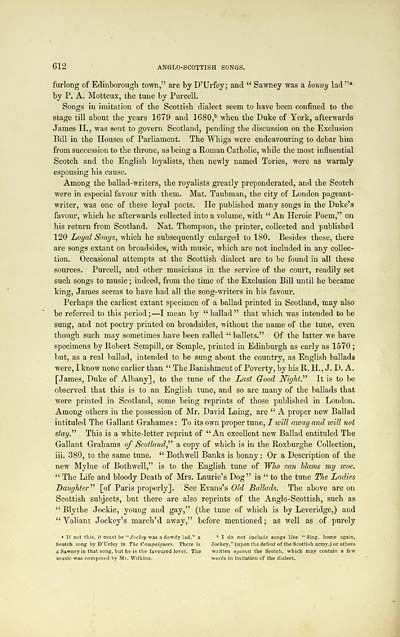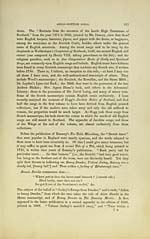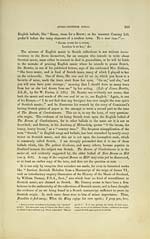Glen Collection of printed music > Printed text > Popular music of the olden time > Volume 2
(236) Page 612
Download files
Complete book:
Individual page:
Thumbnail gallery: Grid view | List view

612 ANGLO-SCOTTISH SONGS.
furlong of Edinborough town," are by D'Urfey; and " Sawney was a bonny lad" a
by P. A. Motteux, the tune by Purcell.
Songs in imitation of the Scottish dialect seem to have been confined to the
stage till about the years 1679 and 1680, b when the Duke of York, afterwards
James II., was sent to govern Scotland, pending the discussion on the Exclusion
Bill in the Houses of Parliament. The Whigs were endeavouring to debar him
from succession to the throne, as being a Roman Catholic, while the most influential
Scotch and the English loyalists, then newly named Tories, were as warmly
espousing his cause.
Among the ballad-writers, the royalists greatly preponderated, and the Scotch
were in especial favour with them. Mat. Taubman, the city of London pageant-
writer, was one of these loyal poets. He published many songs in the Duke's
favour, which he afterwards collected into a volume, with " An Heroic Poem," on
his return from Scotland. Nat. Thompson, the printer, collected and published
120 Loyal Songs, which he subsequently enlarged to 180. Besides these, there
are songs extant on broadsides, with music, which are not included in any collec-
tion. Occasional attempts at the Scottish dialect are to be found in all these
sources. Purcell, and other musicians in the service of the court, readily set
such songs to music ; indeed, from the time of the Exclusion Bill until he became
king, James seems to have had all the song-writers in his favour.
Perhaps the earliest extant specimen of a ballad printed in Scotland, may also
be referred to this period; — I mean by "ballad" that which was intended to be
sung, and not poetry printed on broadsides, without the name of the tune, even
though such may sometimes have been called " ballets." Of the latter we have
specimens by Robert Sempill, or Semple, printed in Edinburgh as early as 1570 ;
but, as a real ballad, intended to be sung about the country, as English ballads
were, I know none earlier than " The Banishment of Poverty, by his R. H., J. D. A.
[James, Duke of Albany], to the tune of the Last Good Night." It is to be
observed that this is to an English tune, and so are many of the ballads that
were printed in Scotland, some being reprints of those published in London.
Among others in the possession of Mr. David Laing, are " A proper new Ballad
intituled The Gallant Grahames : To its own proper tune, / will away and ivill not
stay." This is a white-letter reprint of "An excellent new Ballad entituled The
Gallant Grahams of Scotland," a copy of which is in the Roxburghe Collection,
iii. 380, to the same tune. " Bothwell Banks is bonny : Or a Description of the
new Mylne of Bothwell," is to the English tune of WIw can blame my ivoe.
" The Life and bloody Death of Mrs. Laurie's Dog" is " to the tune The Ladies
Daughter" [of Paris properly]. See Evans's Old Ballads. The above are on
Scottish subjects, but there are also reprints of the Anglo-Scottish, such as
" Blythe Jockie, young and gay," (the tune of which is by Leveridge,) and
"Valiant Jockey's march'd away," before mentioned; as well as of purely
» Tf not this, it must be u Jockey was a dowdy lad," a b I do not include songs like "Sing, home again,
Scotch song by D'Urfey in The Campaigners. There is Jockey," (upon the defeat of the Scottish army,) or others
a Sawney in that song, but he is the favoured lover. The written against the Scotch, which may contain a few
music was composed by Mr. Wilkins. words in imitation of the dialect.
furlong of Edinborough town," are by D'Urfey; and " Sawney was a bonny lad" a
by P. A. Motteux, the tune by Purcell.
Songs in imitation of the Scottish dialect seem to have been confined to the
stage till about the years 1679 and 1680, b when the Duke of York, afterwards
James II., was sent to govern Scotland, pending the discussion on the Exclusion
Bill in the Houses of Parliament. The Whigs were endeavouring to debar him
from succession to the throne, as being a Roman Catholic, while the most influential
Scotch and the English loyalists, then newly named Tories, were as warmly
espousing his cause.
Among the ballad-writers, the royalists greatly preponderated, and the Scotch
were in especial favour with them. Mat. Taubman, the city of London pageant-
writer, was one of these loyal poets. He published many songs in the Duke's
favour, which he afterwards collected into a volume, with " An Heroic Poem," on
his return from Scotland. Nat. Thompson, the printer, collected and published
120 Loyal Songs, which he subsequently enlarged to 180. Besides these, there
are songs extant on broadsides, with music, which are not included in any collec-
tion. Occasional attempts at the Scottish dialect are to be found in all these
sources. Purcell, and other musicians in the service of the court, readily set
such songs to music ; indeed, from the time of the Exclusion Bill until he became
king, James seems to have had all the song-writers in his favour.
Perhaps the earliest extant specimen of a ballad printed in Scotland, may also
be referred to this period; — I mean by "ballad" that which was intended to be
sung, and not poetry printed on broadsides, without the name of the tune, even
though such may sometimes have been called " ballets." Of the latter we have
specimens by Robert Sempill, or Semple, printed in Edinburgh as early as 1570 ;
but, as a real ballad, intended to be sung about the country, as English ballads
were, I know none earlier than " The Banishment of Poverty, by his R. H., J. D. A.
[James, Duke of Albany], to the tune of the Last Good Night." It is to be
observed that this is to an English tune, and so are many of the ballads that
were printed in Scotland, some being reprints of those published in London.
Among others in the possession of Mr. David Laing, are " A proper new Ballad
intituled The Gallant Grahames : To its own proper tune, / will away and ivill not
stay." This is a white-letter reprint of "An excellent new Ballad entituled The
Gallant Grahams of Scotland," a copy of which is in the Roxburghe Collection,
iii. 380, to the same tune. " Bothwell Banks is bonny : Or a Description of the
new Mylne of Bothwell," is to the English tune of WIw can blame my ivoe.
" The Life and bloody Death of Mrs. Laurie's Dog" is " to the tune The Ladies
Daughter" [of Paris properly]. See Evans's Old Ballads. The above are on
Scottish subjects, but there are also reprints of the Anglo-Scottish, such as
" Blythe Jockie, young and gay," (the tune of which is by Leveridge,) and
"Valiant Jockey's march'd away," before mentioned; as well as of purely
» Tf not this, it must be u Jockey was a dowdy lad," a b I do not include songs like "Sing, home again,
Scotch song by D'Urfey in The Campaigners. There is Jockey," (upon the defeat of the Scottish army,) or others
a Sawney in that song, but he is the favoured lover. The written against the Scotch, which may contain a few
music was composed by Mr. Wilkins. words in imitation of the dialect.
Set display mode to: Large image | Transcription
Images and transcriptions on this page, including medium image downloads, may be used under the Creative Commons Attribution 4.0 International Licence unless otherwise stated. ![]()
| Special collections of printed music > Glen Collection of printed music > Printed text > Popular music of the olden time > Volume 2 > (236) Page 612 |
|---|
| Permanent URL | https://digital.nls.uk/91364826 |
|---|
| Shelfmark | Glen.254a |
|---|---|
| Additional NLS resources: | |
| Attribution and copyright: |
|
| Description | Scottish songs and music of the 18th and early 19th centuries, including music for the Highland bagpipe. These are selected items from the collection of John Glen (1833 to 1904). Also includes a few manuscripts, some treatises, and other books on the subject. |
|---|
| Description | The Glen Collection and the Inglis Collection represent mainly 18th and 19th century Scottish music, including Scottish songs. The collections of Berlioz and Verdi collected by bibliographer Cecil Hopkinson contain contemporary and later editions of the works of the two composers Berlioz and Verdi. |
|---|

